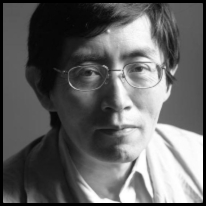
Bei Dao is with Yang Lian and Duo Duo, one of the best-known Chinese poets of the Tiananmen generation in the West. His prose works have suffered from the celebrity of a poetry often considered as a candidate for a Nobel Prize.
Two collections of essays, translated into English, a beautiful novel ” Waves “ (1) and short stories ” 13 rue du Bonheur ” (2) which are completed by a superb autobiographical text “ City Gates Open Up” (3) which has just been translated into French by Chantal Chen-Andro.
1-Rebuilding his city:
Bei Dao, after 13 years of exile, finally obtains permission to return to Beijing to meet his sick father again. “I was a foreigner in my native country… I felt pushed to write this book: I wanted to rebuild a city, to rebuild my own Beijing through writing”.
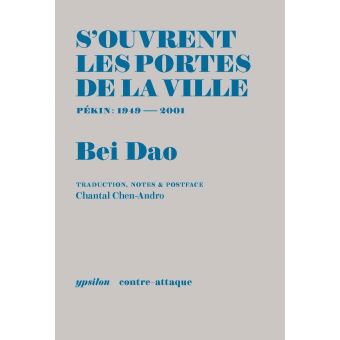
The book brings back to life the attractions of the Beijing of his youth, the shadows, the lights, the smells, the noises. The child tells us about his environment, the toys and games, the transformations brought by the purchase of a television set and then of a record player.
He goes out of his neighbourhood, he goes fishing, he learns to swim but almost drowns in the lake of the Summer Palace. Many outings to look for grass for the rabbits which, during these years of famine, will end up in a pot. The food is very present, it was often missed during his youth.
The relationship with his mother is little talked about and does not seem very close; the relations between the parents are not very peaceful. A long chapter is devoted to his father. A well-known family but more ordinary in the last generations; a comfortable life, his father worked at the People’s Insurance Company of China and then at the Chinese Association for the Promotion of Democracy.
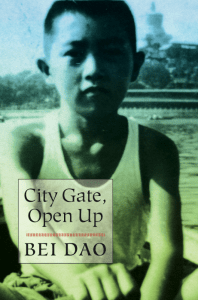
His father reads a lot and is interested in technology. Relationships will be close with his younger sister who died in an accident, more distant with a younger brother and generally of conflict with his father, “every Chinese man harbours within him a little tyrant…at home, he must be the supreme master. » (p.321)
Bei Dao talks at length about the areas his family lived in and their neighbours. In the summer of 1965, he was admitted to High School No. 4, the best high school in Beijing, to the great pride of his parents and neighbours. He reads a lot, including forbidden books hidden in the attic and which will have to be handed over to the Neighbourhood Committee; “the experience of reading is like a lamppost for the road, it illuminates the darkness of human existence” (p.169).
2-Bei Dao and the Cultural Revolution:
He is not even a member of the Youth League, but as soon as classes stopped in June 1966, he devoted himself to wall newspapers and indictments. In August, he goes to live at the high school where he will stay for two years. A teacher commits suicide, the struggle between different factions becomes brutal, he publishes the Journal of the Cultural Revolution at the Lycee. He took part in the Grand Exchange and visited many towns to bear witness to the Cultural Revolution.
The takeover of the Red Guards will lead him to be re-educated through work, eleven years in two construction companies. His parents will be sent to the “Ecole des Cadres du 7 Mai” to be “reformed”.
This vision of the inside of the Cultural Revolution is very fascinating, but Bei Dao does not take stock of his disillusions. With his poem “Answer” (Huida), he becomes the spokesman of a generation; it is above all a question of asserting his freedom, the refusal of the dictatorship of any authority.
The book suffers from an accumulation of details that are not necessary: why tell the history of all the neighbours, classmates… Of course, to focus on the evolution of certain characters is essential but choices have to be made.
The beautiful work of the translator who respects the different styles is to be commended; the rather cold and intellectual approach of Bei Dao is underlined, quite different from the way Chantal Chen-Andro translates Mo Yan! Numerous photos of the family, 30 pages of brief and precise notes, a ten-page history of Beijing and its gates and finally an afterword.
Bei Dao pays homage to his translator in “Midnight’s Gate” and makes her portrait (p.61) during his first stay in Paris in July 1985.
3- ” Waves “, a beautiful novel:
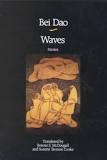
This text was finished in 1974, reworked and published in 1979 in the magazine Jintian. At the time, it was a novel that was completely new in style and topics. Five characters, monologues, no dialogues; no political support in the style of socialist realism. A novel of atmosphere, moods, sensations. The characters live in a state of failure after the collapse of ideals; the system favours selfishness and corruption.
Lin Dongping is a Party cacique, who refuses to be associated with decisions taken in high levels which wants to have them endorsed by the grassroots; likewise, he questions what has become of the compensation for disaster relief?
Yang Xun spent a few days in prison for opposing a tax. He met Xiao Ling, a 23-year-old woman with a little girl, a very endearing and lively character, but a little lost; “Yes, it’s true, I need someone to love me, need someone to help me, if only with a few words of tenderness. In the past, I had a father, a mother, friends… ” (p.53). She talks about her divorce, about working in a factory.
Other characters, Bai Hua, a slightly rogue but generous caretaker. No dramatic progression of the plot even if Yang Xun has to return to Beijing. With Xiao Ling, they don’t know how to build themselves together and love is an illusion.
4- Some short stories:
The collection “13 Rue du Bonheur” includes five short stories. The title short story reminds us that Bei Dao at that time read “The Nausea” by Sartre and “The Castle” by Kafka.
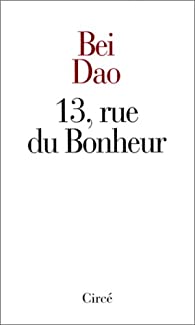
Who lives at 13? He is a journalist, he goes to the Neighbourhood Committee and then to the Public Security Bureau. They all escape from their responsibilities: it’s not my responsibility, we have to have a meeting, 13 is not on the map! “Every time you find yourself in the presence of an individual, tell yourself that you’re dealing with a guilty party…yes, that’s what we call class struggle” (p.113). The narrative becomes surreal and the absurd reigns.
“A stranger returns” is a beautiful text, albeit a little melodramatic. The father is back after 20 years of re-education through work, he has been totally rehabilitated and given a good home; the “friends” return. His daughter has not seen him since the age of four and has regretted the love she did not have. A little and old man arrives who is still terrorized in his behaviour by the rules of the camp. She isolates herself in her room, her mother accuses her of selfishness and stresses that he survived only for his children.
He asks her to accompany him to the park where he used to take her for walks as a child. They talk, he says that he has not been able to protect her, that he is not worthy to be her father. They cry, he gives her a necklace he made for her in the camp out of old toothbrush handles.
5- Essays about exile:
Two collections are only available in English.
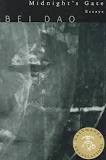
” Midnight’s Gate “ (5) essentially tells us about the personalities he met during his literary tours during his period of exile. It details the people in charge of the Poetry Festivals who are often poets, but also men of power.
He travels around the world, a bit of tourism, superficial encounters and pleasant dinners with good wines; “In my wanderings overseas, alcohol has been my most loyal companion. It consoles and make promises…it never betrays you and at worst it gives you a headache for a few days” (p.194).
He speaks at length about his stay in Palestine, the unacceptable attitude of the Israelis and his reception by Arafat. As Octavio Paz says, “poetry is a third voice apart from religion and revolutions. This voice cannot truly eliminate hatred, but perhaps can alleviate it to some degrees”. (p.105).
He mentions very little of his poetry or his works, does not give us the reactions of his colleagues; this is a bit disappointing. He details life in New York which he does not like: “a truly nostalgic destination. It’s like driving a car: look straight ahead, don’t look back, just let your mind idle, perfectly aware of what has disappeared behind you” (p.41).
He underlines the contacts he appreciated: Wolfgang Kubin in Germany, Gregory Lee during his stay in Durham, “he understood China better than many other sinologists” (p.205).
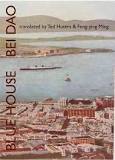
“The Blue House” (4) tells about his removals: “In the six years between 1989 and 1995, I lived in seven different countries and moved fifteen times” (p.213). He details his family life, his relationship with his daughter Tiantian and especially his loneliness: “for Chinese in the West, the worst thing is loneliness; a deep sense of isolation. Americans understand this from the day they are born, but we Chinese must learn it “(p.195).
He is isolated and a little depressed; the Americans he meets help him: Allen Ginsberg, Gary Snyder, Eliot Weinberger, Jonathan Spence… A true friend will be for him the Swedish poet Tomas Transtromer, very popular in his country and Nobel Prize winner; he talks about him with emotion and makes us want to read him.
He mentions his life in California in Davis and his liking for gambling: “Chinese like to gamble, something that I think is related to a national propensity for the irrational, a belief in fate rather than gods…There is also no linguistic or cultural barriers…if you lose today there is always tomorrow”(p.241).
Bertrand Mialaret
(1) Bei Dao, “Waves”, translated by Chantal Chen-Andro. Editions Philippe Picquier 1993, 193 pages.
Bei Dao, ” Waves “, translated by BonnieS. McDougall and Suzette Ternent Cooke, New Directions 1990, 208 pages.
(2) Bei Dao, ” 13 rue du Bonheur “, translated by Chantal Chen-Andro. Circé 1999, 112 pages.
(3) Bei Dao, ” S’ouvrent les Portes de la Ville, Pékin 1949-2001 “, translated by Chantal Chen-Andro. Ypsilon June 2020, 380 pages.
Bei Dao, “City Gates Open Up”, translated by Jeffrey Yang. New Directions, April 2017.
(4) Bei Dao, “The Blue House”, translated by Ted Huters and Feng-ying Ming. Zephir Press 2000,260 pages.
(5) Bei Dao, “Midnight’s Gate”, translated by Matthew Fryslie. New Directions, 2005. 255 pages.





